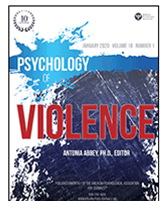Sympathy for violent radicalization among college students in Quebec (Canada): The protective role of a positive future orientation
Objective: The present study examined whether a positive future orientation was linked to lower levels of sympathy for violent radicalization (VR) beyond the contributions of depression among a sample of college students in Quebec, Canada. In addition, we investigated whether these associations varied by gender and levels of depression. Method: A total of 1,680 college students (71% women: 74% aged between 16 and 21 years) were included in this study. Linear mixed-effects models were implemented to test the contributions of future orientation and depression to sympathy for VR, controlling for the relevant sociodemographic variables. Results: A positive future orientation was linked to lower sympathy for VR beyond depressive levels (β = −0.08, 95% confidence interval [CI] [−0.13, −0.04]). This association was stronger among participants with higher depression scores (β = −0.11, 95% CI [−0.20, −0.01]) compared with participants with lower depression scores (β = −0.05, 95% CI [−0.16, 0.05]). The association was also modified by gender with a negative effect observed only in men (β = −0.18, 95% CI [−0.26, −0.10]). Finally, when conducting gender-stratified analyses, higher future orientation was associated with lower sympathy for radicalization among men with higher depression scores (range of estimates: −0.21 to −0.26). Conclusions: Youth who lack positive perspectives of the future may support violence. Fostering a meaningful vision of the future in youth may be a way to counter the attraction of VR. Schools and colleges are in a privileged position to implement preventive interventions to support a positive future orientation. (PsycINFO Database Record (c) 2019 APA, all rights reserved)

